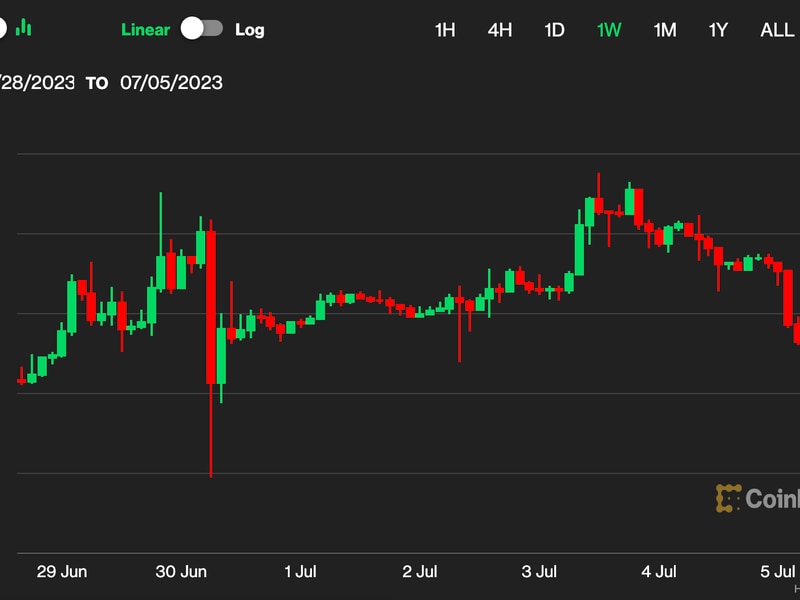Romper Room to White Linen: Saying Goodbye to Crypto’s Infant Anarchy

Sheila Bair is an advisor to Omniex, a technology company providing services to institutional investors, and a board member of the Paxos Trust, a regulated trust company developing blockchain technology.
She does not own crypto assets. The views expressed are her own. The following is an exclusive contribution to CoinDesk’s 2018 Year in Review.

When our children were small, we would take them to a local Mexican restaurant that had an upstairs dining room specially reserved for families with young kids. Entering that dining room was entering a cacophony of crying babies and screaming toddlers, with 40-inch tall humans running amok, perilously circumventing waiters and hiding under tables to evade parental clutches.
Given that our own daughter liked to drink salsa right out of the dipping bowl, while our son typically landed more guacamole on the floor than in his mouth — we loved it. It was meant to be anarchy.
No one cared if our kids failed to follow proper dining etiquette. But as the kids matured and acquired proper table manners, we moved downstairs to the main dining room, where the grown-ups demanded a higher level of service, and behaved accordingly. The proprietors even dared to use white table cloths, which remarkably stayed salsa-stain free.
In their early years, the cryptocurrency trading markets were a bit like that upstairs dining room.
Dominated by adventurous, risk-seeking technology buffs (and some crooks), anarchy prevailed as there were no clear rules around trading, know-your-customer or security standards. Every trader looked out for him or herself.
But as these markets have matured, a few exchanges have now sought regulated status as trust companies, subject to annual examinations by bank regulators, capital requirements and the full panoply of anti-money laundering and cyber security rules.
The recent launch of bitcoin futures products on exchanges regulated by the CFTC have reinforced this trend, prompting the adoption of anti-manipulation policies, better market surveillance, and information-sharing agreements between the crypto spot markets and regulated futures exchanges.
As crypto trading has survived and matured, we now we see institutional investor interest picking up (bitcoin prices notwithstanding). Regardless of which cryptocurrencies ultimately succeed (I tend to think bitcoin will survive as a store of value), the smart money has come to accept crypto as a new, legitimate asset class and is seeking well-regulated venues to invest.
Even Boston Brahmin Fidelity is entering the space, recently announcing the launch of a separate company to handle custody and trade execution for institutional customers.
Hurdle ahead
Still, many institutional investors are reluctant to take the plunge.
It is a testament to the strength of the Security and Exchange Commission’s investor protections that they want a way to take a position in crypto through a product on a regulated securities exchange. Yet, recently the SEC disapproved nine applications it received to list a crypto exchange traded product (ETP).
Still pending is the CboeBZX Exchange’s application to list and trade SolidX Bitcoin Shares issued by the VanEck SolidX Bitcoin Trust. Many viewed this application as having the best chance of getting a nod from the regulator.
However, in recent remarks before the Consensus Invest conference, SEC Chair Jay Clayton seemed to pour cold water on SEC approval of any ETP as he re-iterated SEC concerns about the strength of market surveillance in crypto spot markets as well as protections against “theft or disappearance” of crypto assets.
The SEC is right to focus on protecting investors against market manipulation and the security of their crypto assets. These are core to the SEC’s mission. However, there is not an asset class on the planet where absolute guarantees can be made against cyber-attacks or attempted manipulations. The real question is whether the proposed ETP offers protections that are as strong as those afforded investors for other types of exchanged-traded products that have been approved by the SEC.
With regard to protections against investor loss from criminal activity or operational error, the VanEck trust is providing significant protections. Unlike other ETP applications, when an investor buys the VanEck shares, the fund will buy an equivalent amount of real bitcoins. It will secure the bitcoin by using industry best practice: multi-signature cold storage wallets with backups in geographically diverse locations for disaster recovery purposes.
Adding a belt to these suspenders, it will maintain comprehensive insurance to protect investors against loss.
Striking a balance
However, the strength of market surveillance and anti-manipulation policies varies widely across the many crypto trading markets, and this is a cause for concern. On the plus side, the large number of venues in which bitcoin trades arguably makes it less susceptible to manipulation than spot markets for other assets where trading is more concentrated.
Active arbitrage between the OTC and spot exchanges should also reduce manipulation risk. In addition, there are no insiders or material non-public information on which to trade, and it would be difficult to disseminate false or misleading information about bitcoin because aggregate supply is determined by a public, straightforward algorithm.
But on the negative side, the bitcoin spot market’s thin liquidity and domination by individual investors increases manipulation risk. The conundrum here is that increased institutional participation in these markets – which would be facilitated by the SEC’s approval of the ETP – is probably necessary to achieve greater liquidity.
More generally, the entry of more demanding institutional traders would have a disciplining effect on crypto exchanges to tighten surveillance. The fact that the initial per-share price of the ETP is 25 bitcoins means shares will be traded by institutional and other substantial investors who are better equipped than retail investors to drive greater transparency and anti-manipulation safeguards.
Yet, the SEC has a difficult task in ensuring appropriate investor protections without setting impossibly high standards. By accommodating greater institutional participation in crypto assets, the SEC could force improved standards in the spot markets where retail investors dominate – sometimes at their peril.
Testing an ETP with an institutional investor base could inform future work on a retail product giving individual investors venues to trade under the watchful eye of the SEC. Crypto assets are ready for the white linen treatment of a fully regulated securities exchange.
Let’s hope the SEC can find a careful path forward.
Have an opinionated take on 2018? CoinDesk is seeking submissions for our 2018 in Review. Email news [at] coindesk.com to learn how to get involved.
Glasses image via CoinDesk archives










